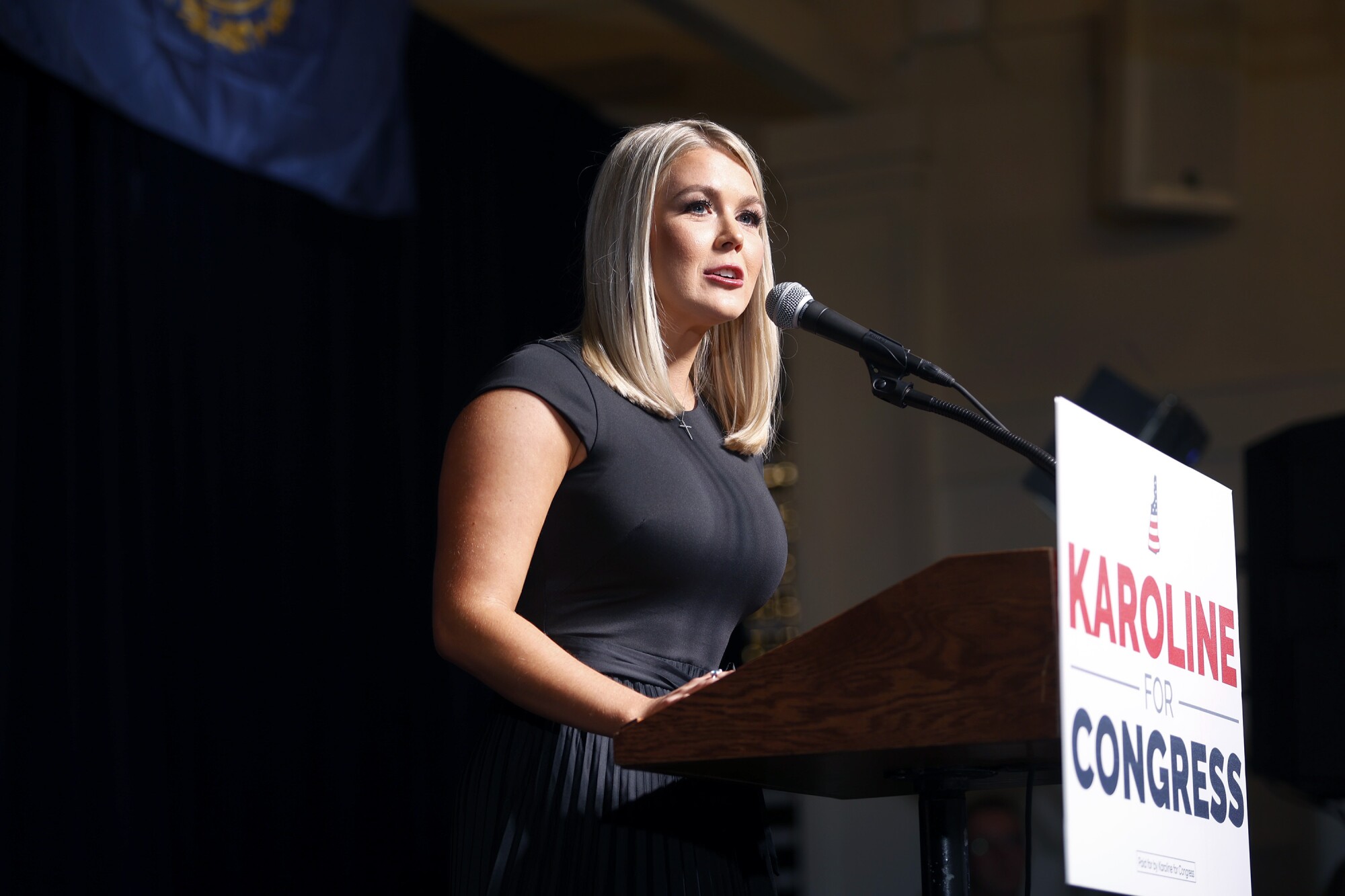When White House press secretary Karoline Leavitt’s failed congressional campaign amended its filings last week — revealing that she appears to have received hundreds of thousands of dollars in excessive donations that she never paid back — the campaign also revealed that it broke another fundamental rule of political fundraising: don’t take money from businesses straight to the bank.
Before spending donations from businesses, campaigns are supposed to do due diligence to make sure the contribution is allowable. But according to years of reprimanding letters from the Federal Election Commission, Leavitt’s campaign frequently failed to follow these basic legal guidelines. And now, as Leavitt takes the briefing room podium, her unsuccessful campaign from 2022 still owes businesses tens of thousands of dollars.
New FEC records that Leavitt filed last week show that her campaign still owes about $38,000 in refunds to nearly 30 companies. And ethics experts said these debts to businesses raise serious questions about why her campaign ever cashed these checks in the first place, let alone subsequently failed to pay the money back for years.
It’s also yet another wrinkle in the outstanding debt — $326,370 in total — that Leavitt’s campaign owes to donors, companies and vendors.
Under the law, the refunds to both excess donors and companies should have been issued within 60 days. But years later, the debts remain unpaid, according to the new records, after the campaign last week amended every campaign finance report it had ever filed.
Leavitt’s debts to businesses don’t appear to fall into the category of automatically banned corporate contributions. Campaigns can accept donations from LLCs if those contributions are attributed to individuals. But across years of filings, the campaign frequently failed to disclose who the LLC was attributing the donation to and didn’t return the money when it failed to assign the money, which is illegal.
It’s why the campaign owes many of these businesses refunds — only the campaign doesn’t have any money to pay back the businesses.
Leavitt’s campaign reports that it only has about $8,000 in cash on hand. (In another odd disclosure, the campaign wrote in its latest filing that it believes this reported number is “low by approximately $4,000,” though it is still trying to work out the discrepancy.)
Regardless, a spokesperson insisted to NOTUS that Leavitt hadn’t done anything wrong.
“We’ve already provided a clear statement and it’s ridiculous we have to do this again for a click bait story very conveniently timed with Karoline’s new role as White House Press Secretary,” said Erin Perrine of Axiom Strategies, a consulting firm that the Leavitt campaign still owes $46,748. “As we’ve previously stated, the campaign has followed the FEC’s instructions and there were no acts, errors, or omissions by the candidate.”
(Perrine appears to be serving as a private spokesperson for Leavitt, after previously serving as communications director for Ron DeSantis’ presidential PAC. Perrine also handled a comment request for Leavitt last week, when the campaign amended its filings.)
What Perrine said may technically be correct: It’s possible there were no errors or omissions “by the candidate.” But that doesn’t excuse how her campaign could have made these mistakes — or why it hasn’t remedied the situation.
After years of not returning the money, there are real questions about whether Leavitt ever intends to refund the donations, or whether she simply intends to challenge FEC administrators to do something about it.
A few of the disclosures for the outstanding business donation refunds note “best efforts to collect data,” or an individual attribution, but the majority do not provide this legally mandated information.
For example, the campaign owes a $5,800 refund to Hampton Household Expense LLC, which had already been dissolved by the state at the time of the donation, according to New Hampshire business records. (The LLC was not immediately reachable for comment.) The campaign also owes another $5,000 to a Courtyard by Marriott in Portsmouth, New Hampshire, according to the latest finance reports. (The hotel’s manager did not respond to a request for comment.)
Each time the campaign disclosed these donations — both when it received them in 2022 and in subsequent amended filings — the campaign provided none of the additional information needed to prove the funds were from an authorized source.
Even more stunningly, for a handful of the businesses owed refunds, the campaign has never declared even receiving a contribution in the first place.
“They’re supposed to check up when they got these contributions. You don’t just take things and put them in the bank. That’s not how you how it works,” one longtime FEC expert and attorney told NOTUS. “If you get anything other than a personal check, you have to do some research, right? And that’s their obligation, that’s their duty under the FEC regulations, and it doesn’t look like they did much of that.”
While the Leavitt campaign’s questionable bookkeeping presents a number of ethical issues, experts told NOTUS one glaring problem is that it could put her security clearance in jeopardy — if there’s evidence she was aware of the campaign’s financial issues.
“Delinquent debt is one of the potentially disqualifying conditions for clearance,” the president of the Federal Clearance Assistance Service, William Henderson, told NOTUS. “It’s mitigatable if it was due largely to circumstances beyond the individual’s control and they were making good faith efforts to repay.”
A spokesperson for Leavitt previously told NOTUS the campaign is “working with the FEC to address outstanding issues, none of which directly involved the candidate.”
And yet, according to the campaign finance records filed last week, the campaign has not repaid its debt. In fact, what was reported as a $105,605 debt in September of last year has instead tripled in the new disclosures.
There is a distinction between personal debt and debt from affiliated organizations, like the campaign, which could spare Leavitt direct responsibility for the debt, Henderson said.
But another provision of the background check process could be held up by issues around “personal conduct” or “unwillingness or failure to follow rules and regulations,” he explained.
“There doesn’t have to be a charge; there just has to be some association with illegal activity,” another security clearance expert, attorney Dan Meyer, told NOTUS. “If the FEC, as an official federal organization, has identified something that looks like a potential violation of law, rule or regulation, then that at least has to be reviewed.”
Of course, security clearances are also now less of an issue, after one of President Donald Trump’s first acts was to change the rules on clearances, allowing him to circumvent background checks and grant a six-month top secret clearance to his White House staffers without any of the usual protocols.
Still, the campaign’s unresolved debt could be a problem. And experts suggested it should give people pause.
“This clearly shows someone who is fast and loose with the rules. These are failures to regard rules against corruption,” Stuart McPhail, director of campaign finance litigation at the left-leaning Citizens for Responsibility and Ethics in Washington, told NOTUS.
“An administration that calls itself ‘law and order’ — and has even called for people who take things illegally to be shot without trial — is being joined by somebody who, her own campaign has been taking money unlawfully,” McPhail said. “This stuff is campaign finance 101. You don’t take freebies.”
Although the campaign still owes hundreds of thousands in refunds, it was able to issue at least some refunds in a timely manner in the past.
The FEC questioned the campaign in 2022 because it “discloses a refund of a contribution received from Nicholas Riccio. However, it appears that your committee refunded an amount greater than the original contribution.”
The campaign’s original 2022 financial report said it paid a $2,900 refund to Riccio, despite receiving less than that from him in contributions. After the FEC’s letter, the campaign changed that number to $1,000 on three subsequent amendments, in an apparent appeasement to the agency.
But interestingly, the campaign’s latest filings say it still owes Riccio more money in refunds, even though there aren’t additional reported donations from him.
Riccio, who was on the campaign’s finance committee, according to local reporting at the time, is now Leavitt’s husband.
—
Claire Heddles is a NOTUS reporter and an Allbritton Journalism Institute fellow.
Sign in
Log into your free account with your email. Don’t have one?
Check your email for a one-time code.
We sent a 4-digit code to . Enter the pin to confirm your account.
New code will be available in 1:00
Let’s try this again.
We encountered an error with the passcode sent to . Please reenter your email.



